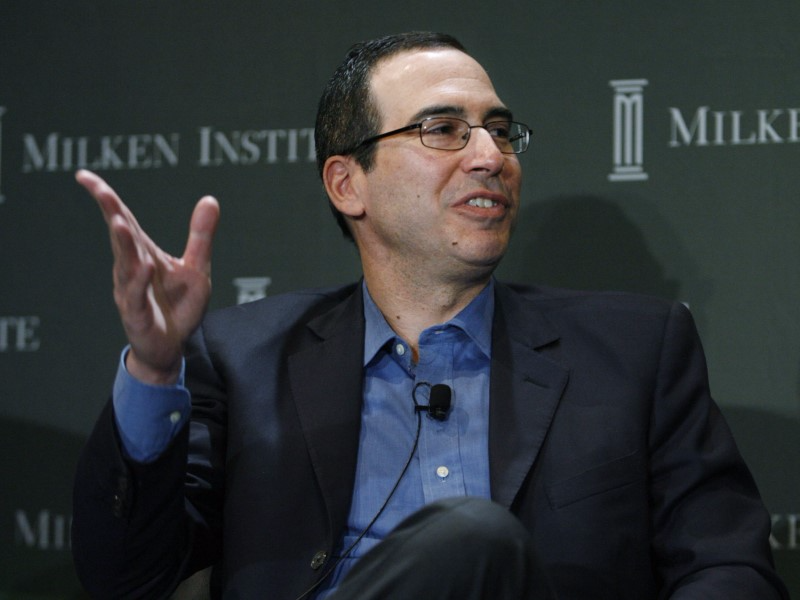President-elect Donald Trump has made his pick.
After much back-and-forth over who would be appointed Treasury secretary, Trump has settled on Steve Mnuchin.
Mnuchin is likely to be a controversial pick, however, who is unlikely to sit well with voters who backed Trump’s anti-Wall Street campaign rhetoric.
He is a former Goldman Sachs mortgage bond trader who has worked or entered into deals with hedge fund managers like George Soros, Eddie Lampert, and John Paulson.
He then led a deal to buy IndyMac, a failed bank, in the depths of the financial crisis, most likely making a huge amount of money in the years that followed. During his tenure at the top of the bank, it faced a consent order over its foreclosure process, and more recently the bank has been accused of discriminating against blacks, Hispanics, and Asians.
Here's some highlights from Mnuchin's career:
- Mnuchin spent 17 years with Goldman Sachs, and his father worked at the bank for 30 years in stock trading. He was the head of the mortgage department in the early days of collateralized debt obligations and credit default swaps, instruments that many have argued had a part to play in the financial crisis. In that role, he worked for Goldman Sachs' current CEO, Lloyd Blankfein, who at the time was head of fixed income. Blankfein said earlier this month that Mnuchin a "highflier," "a very nice guy," and a "smart, smart guy." He left Goldman to join Eddie Lampert's hedge fund ESL Investments. Lampert had been a roommate at Yale. Lampert is now the CEO of the retailer Sears. You can read about how that has played out here. He then set up an investment fund with George Soros. Blankfein and Soros were featured in a campaign ad for Trump that took aim at a "global power structure" that had "robbed our working class, stripped our country of its wealth, and put that money into the pockets of a handful of large corporations and political entities." During the depths of the financial crisis in 2009, a group led by Mnuchin bought the troubled housing lender IndyMac. The buyer group included Soros, hedge fund billionaire John Paulson, former Goldman Sachs executive Chris Flowers, and tech billionaire Michael Dell. After renaming the company OneWest, Mnuchin served as chairman until selling it to CIT Group in 2015. In 2011, the Office of Thrift Supervision issued a consent order against the bank after a review. Mnuchin was chairman at the time. "The review uncovered unsafe and unsound practices, violations of law and foreclosure processes geared toward speed and quantity, instead of quality and accuracy," a statement at the time said. Two California housing watchdogs have filed a federal complaint accusing OneWest of violating the Fair Housing Act by discriminating against blacks, Hispanics, and Asians. According to the complaint, market share and regulatory data shows that "since at least 2011, respondent made few loans to Asian American, African American, and Latino borrowers and communities in absolute terms, in relation to the demographics of the counties in respondent's CRA assessment area, and/or in relation to the industry as a whole." Mnuchin oversaw OneWest until it sold to CIT for $3.4 billion, more than double the $1.55 billion the buyer group paid. The owners also took out $1.9 billion in dividend payments from the bank, according to the Los Angeles Times. Mnuchin stayed on and took a seat on the board of CIT, which is valued at about $7.9 billion. He was one of the early backers of Donald Trump, much to the surprise of some of his former Wall Street colleagues. He told Max Abelson and Zachary Mider at Bloomberg in August that a top Washington job appealed to him. "Nobody's going to be like, 'Well, why did he do this?' if I end up in the administration," he said then.
Mnuchin, if he does get selected by Trump, will have to go through confirmation hearings with the Senate Finance Committee. It's likely to be an interesting process.
"Given Mr. Mnuchin's history of profiting off the victims of predatory lending, I look forward to asking him how his Treasury Department would work for Americans who are still waiting for the economic recovery to show up in their communities," Senate Finance Committee Ranking Member Wyden (D-OR) said in a statement.
